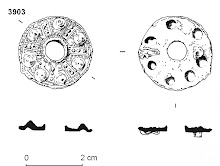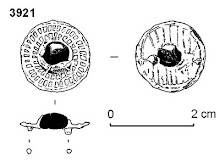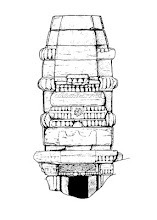So far the winter here in Gloucestershire has been mostly mild and wet and very windy rather than cold and snowy, but I thought it worthwhile to repost this piece I wrote for the Diggers' Forum a few years ago. Winter is always a challenging time for those working on site, and with the current gales and wet weather this year is no different and its not likely to get a lot better for a fair while yet. We've put together a few tips for both diggers and supervisors to help you survive the winter –after all, it may keep coming til April!
Cold weather working: a survival guide
 |
| Pretty skies, but can you see what you are digging? |
First off, if the weather forecast is really bad do you have to be on site? Should the work be delayed til more clement weather arrives? Is the weather just so bad that even leaving home is pointless? Are the other contractors going to be there and is the site open? Your employer should have contingency plans for cold weather and they should let you know what these are and what is expected of you as well as what to do if you get stuck in the snow away from home. Talk to your Project Manager about whether the site must go on and whether any adaptions can be made such as staying in accommodation near site rather than driving in every day.
Check the forecasts regularly, there are road, motorway, flood and weather warnings available online, as well as live traffic updates, listen to local radio and avoid known blackspots.
Communicate with each other and make sure everyone knows what is expected of them and someone at the office knows where you are and where you are heading. As a supervisor, make sure you know how your colleagues are getting to site, and make sure everyone has each others' phone numbers in case something goes wrong.
Is that journey really necessary? These days you shouldn't have to resort to tea-lights under the engine to dewax frozen diesel, but do make sure your vehicles are winter ready. If you have to drive, then drive safe and drive slow and watch out for black ice even after the snow is gone.
Driving to work: Check that the roads are open and drive carefully, listen to traffic and weather updates. Make sure both your own vehicle and any work vehicles are fit to drive and properly de-iced and de-misted, you've got a survival kit including shovel, FA kit, working torch, blanket, food and drink, hi-viz jacket and a fully charged mobile. Anticipate that there may be breakdowns and how you will deal with them. Make sure you have the phone number for your breakdown company.
Make sure that you are provided with proper welfare facilities: This should include somewhere to warm up and get out of the weather. On many urban sites water pipes will have frozen or been drained, make sure there are alternative facilities for hand washing and toilets and hot drinks are available. With Oasis cabins and Groundhog units available you shouldn't have to suffer out in the cold, you are also entitled to 'reasonable' temperatures in toilets and changing rooms. Watch out for fire risks from clothes put to dry next to heaters and for carbon monoxide or fumes from gas heaters or exhausts.
As a supervisor make sure your colleagues keep warm and aren't suffering, think about having extra rest breaks to allow staff to thaw out. The pressure may be on you to carry on, but the company will lose far more money if everyone goes off sick with exhaustion. Make sure risk assessments are updated and give a toolbox talk to staff to ensure that everyone knows where they stand.
Remember it gets dark! You'll probably be driving to and from site in the dark, and at this time of year the working day seems to be mostly in the gloom. Make sure you finish any safety critical work before you need a torch, and remember to take photographs before sunset.
Some medical conditions such as heart conditions and respiratory diseases may be exacerbated by cold weather so be aware if any staff are on medication. Watch out for chilblains and frostnip as well as severe shivering which may lead to hypothermia -get the casualty indoors and warm them slowly and seek medical help. Cold can also lead to increased accidents as it is far harder to concentrate and you may be encumbered by bulky clothing.
Keep warm: Get some long johns and use the layer principle to keep warm: take a layer off if you are too warm whilst hacking out that ditch, but put it back on straight away after. Use wicking tops if possible to draw sweat away from your skin, cotton is not good as it becomes cold and clammy. Wear a hat or balaclava –although make sure your hard hat still fits, maybe make some wrist covers and get some ear muffs to keep your extremities warm and prevent heat loss.
Watch out for wind chill: The wind is what will make it feel really cold, and can cause wind-burn by itself. If there is a gale forecast make sure everything loose is fastened down -you don't want to spend ages rescuing sample tub lids from the hedge.
Proper gloves: gardening/rigger style gloves just don't cut the mustard in really cold weather. Get a range of gloves including thin gloves that you can wear whilst writing or using survey kit: silk liner gloves fit under heavy work gloves. If you are machine watching consider big overmitts as they keep your hands warm whilst inactive, you can keep a pair of thinner gloves on underneath. Tools are cold, especially steel handled shovels, so make sure your hands are warm and stay warm.
 |
| Your home for the next few days? You can't beat a good puddle-sucker. |
Bailing out flooded features is more dificult this time of year, where will the water go? Do you need to dig a sump? Is everything ready to take the photo/record the feature before it fills up again? Can you get a pump on site to clear large features -where will it pump the water to! With all that water around things are slippy and deep features are more prone to collapse. Proper waterproof gloves are essential if you are having to bail out flooded features, and after bailing out make sure you wash your hands before eating.
Hand cream: Use a decent cream to stop your hands drying out and cracking up. Cracked skin is extremely painful and if the splits are deep they won't heal til the summer. Neutrogena Norwegian Formula is good.
Look after your feet: keep them warm, use two pairs of socks if need be, thin liner socks add warmth for little bulk. Put fresh socks on when you get off site -you don't want trench foot. Wash and pamper your feet every day, you're on them all day so give them some TLC and a nice warm soak.
Mind out for ice and snow-ice: Slips and trips, especially when the ground is covered in snow, are a major cause of accidents. Keep the site tidy and grit or clear walkways.
Cover the site: If the site is small enough you may be able to use tarpaulins or plastic sheeting. 'Terram' geotextile is especially good. The sheeting will allow you to remove snowfall quickly, and will insulate the ground. If you can't cover it, then sweep up snow before any thaw.
|
Anyone got 50p for the meter? Thawing out the strat in -16c photo ©Dan Sausins |
Get a heater! We used a portable space heater to thaw out frozen stratigraphy (and diggers) and it worked a treat. Make sure the main contractor will allow it, and you'll need to do risk assessments, a toolbox talk on how to use it and potential risks would be a good idea. Its well worth the cost as it means that you can actually work! You can get gas or electric –just don't use electric when it is snowing!
Beware of RSI! Mattocking frozen ground is seriously bad for your tendons and hands. Prolonged mattocking of concrete-hard ground is likely to lead to injury and possibly contribute to Repetitive Strain Injury. The same goes for using jackhammers –and of course you have a ticket, method statement and risk assessment to cover their use? Damage to you is likely to be more severe due to the cold. If you have to hack at frozen ground or use a kango, then alternate tasks and take rests.
Go to the caff! If you are in a town then having a sit-down breakfast is warming, good for morale, and will keep you going through the day. You need to eat more in cold weather, especially when working hard, so tuck in!
Use a hankie! In congested welfare huts germs spread amongst the fetid masses huddled round the heater. If you have the pox, then don't give it to everyone else. They won't thank you for it.
| Typical site conditions in February? |
Don't be afraid to pack it in: You're archaeologists digging a site, not the Grande Armée retreating from Moscow. If the weather is simply too atrocious then get out of it. You won't get a medal for getting hypothermia.
Stay warm!
HSE advice: http://www.hse.gov.uk/temperature/outdoor.htmhttp://www.hse.gov.uk/temperature/outdoor.htm














No comments:
Post a Comment